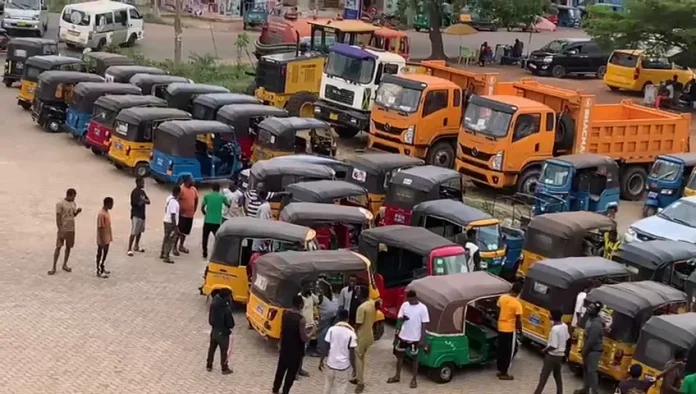Dozens of tricycle operators rode to the Tafo Municipal Assembly on Friday to protest proposed restrictions they say will devastate their livelihoods and exclude them from key business areas.
The operators, known locally as pragyia riders, chanted war songs as they delivered a petition urging officials to reverse movement limitations being imposed across the municipality. The demonstration briefly disrupted activities at the assembly before calm was restored.
Municipal authorities defend the restrictions as necessary measures to improve traffic management and ensure road safety, particularly within the central business district. However, operators argue they were never consulted before policies affecting their survival were announced.
Seidu Mubarak, Ashanti Regional Chairman of the National Union of Tricycle Operators of Ghana, accused the assembly of imposing policies without engaging stakeholders. He emphasized that operators deserve input into decisions that directly impact their ability to earn income.
“We were not part of this decision, and that is why we are here today to present our grievances,” Mubarak stated during the protest. “They are restricting us from operating through Mile 4, an area where tricycles are needed most.”
The union chairman warned that operators will return in greater numbers if the assembly refuses to negotiate. “If the assembly is not willing to work with us, we will return here in full force,” he said.
The Municipal Coordinating Director received the petition on behalf of the Assembly and promised to forward it to appropriate authorities for consideration. Assembly officials did not immediately indicate whether they would engage operators in dialogue before implementing the restrictions.
Tricycle operations have become contentious across Ashanti Region municipalities as local authorities grapple with congestion in urban centers. The Kumasi Metropolitan Assembly (KMA) implemented similar restrictions in April 2023, limiting pragyia and aboboyaa movement into the central business district from adjoining municipalities.
Data from the Driver and Vehicle Licensing Authority (DVLA) indicate approximately 26,000 motorized tricycles operate in Ashanti Region, with Kumasi alone accounting for nearly 14,000 pragyia and aboboyaa vehicles. These tricycles provide affordable transportation alternatives for commuters and employment for thousands of young people.
The KMA restrictions included penalties of 500 Ghana cedis for violations and confiscation of tricycles. However, enforcement has proven challenging, with riders widely disregarding the limitations more than a year after implementation.
Public Relations Officer of the Pragyia and Okada Riders Union of Ashanti, Al-Asbat Alhassan Sidi, previously defended the industry’s importance to young people struggling with unemployment. “Currently, in the system, there’s no job. So presently, we have about five or six graduates from KNUST riding pragia,” Sidi explained in 2023. “So if for nothing, pragia has been a source of jobs for the youth in the system.”
Riders and their supporters argue that tricycles fill critical gaps in Ghana’s transportation network by accessing areas where conventional taxis and trotros cannot reach. Passengers also prefer pragyia for affordability, with fares typically 30 to 50 percent lower than taxi charges for similar distances.
Old Tafo Municipal Assembly was carved out of Kumasi Metropolitan Assembly in 2018 as one of 38 newly created and upgraded districts. The municipality covers approximately 31.13 square kilometers in the center of Ashanti Region and recorded a population of 114,368 in the 2021 census.
Transportation restrictions have sparked protests across Ghana in recent years as authorities attempt to reorganize urban mobility systems. The National Democratic Congress (NDC) pledged during the 2024 election campaign to legalize and regulate tricycle operations if elected, promising training programs and clear operating guidelines for the industry.
President John Dramani Mahama’s government has not yet announced a national policy framework for tricycle operations since taking office in January 2025. Operators nationwide continue seeking legal recognition and protection from arbitrary restrictions imposed by local assemblies.
Source: newsghana.com.gh











